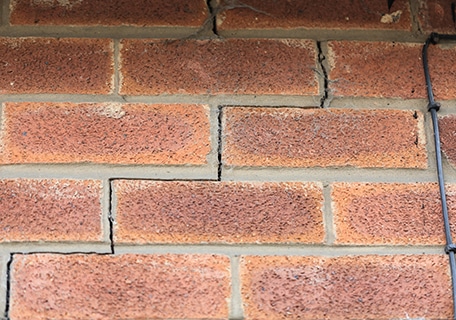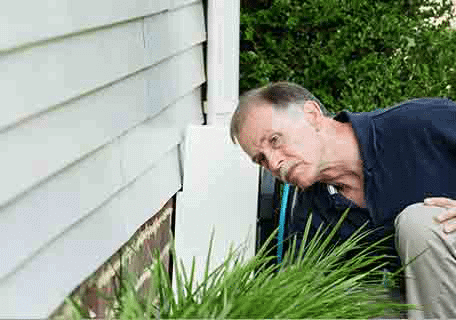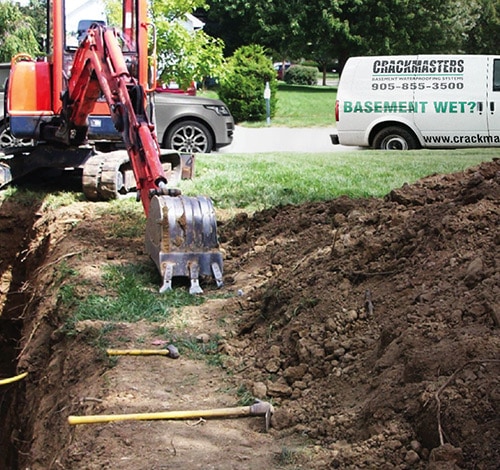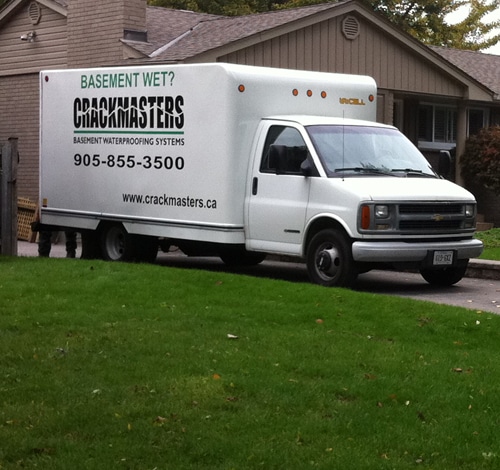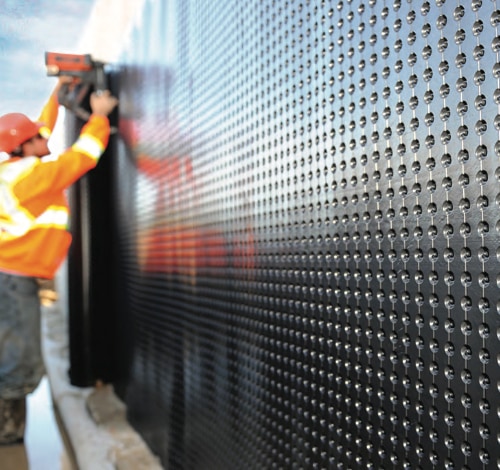Crackmasters Basement Waterproofing Systems
Frequently Asked Questions
Don’t let basement problems keep you guessing! Crackmasters is here to help. Our comprehensive FAQs provide quick answers to your most pressing questions about basement waterproofing, foundation repair, and crack repair. Find the information you need to keep your basement dry and your home secure. Still have questions? Contact Crackmasters for a free consultation!
Why does my basement leak?
Water intrusion in your basement can result from various factors, each requiring a tailored solution. Some common causes include:
- Cracks in poured concrete walls.
- Cracks in block walls.
- Sump pump failures.
- Hydrostatic pressure leading to water seepage from the floor.
- Poor drainage in window wells.
- Ineffective or absent weeping tiles.
Each issue has a specific repair method. For more detailed information and to discuss the best solution for your basement, please call us at 905-855-3500.
What signs indicate a basement leak?
If you're concerned about a potential leak in your basement, watch for these telltale signs:
- Musty or moldy odors indicating moisture presence.
- A white powdery substance on walls, known as efflorescence.
- Visible cracks in the floorboards or walls.
- Paint that is cracking or wallpaper that is peeling.
- Wood that is rotting.
- Paneling that shows signs of erosion.
These indicators suggest that water may be seeping into your basement, and it's important to address them promptly to prevent further damage.
What causes basement cracks?
Basement cracks can arise from a variety of sources, often related to the natural settling of a house over time. Other common causes include:
- Changes in soil moisture levels can cause the ground to expand and contract, exerting pressure on the foundation.
- Insufficient or improper construction techniques and materials can lead to weaknesses in the foundation.
- Water accumulating in the soil around your foundation can push against the walls and create cracks.
- Seasonal changes and severe weather conditions can cause the materials in your foundation to expand and contract, leading to cracks.
Understanding the root cause of basement cracks is crucial for determining the appropriate repair method.
How do I know if a basement crack is serious?
Determining the severity of a basement crack often requires assessing several factors:
- Cracks wider than 1/8 inch often require professional assessment.
- Horizontal cracks can be more serious than vertical ones, indicating potential structural issues.
- Long cracks or those near the corners of the basement can be particularly concerning.
- Cracks that continue to grow or leak water are signs of ongoing issues.
- Signs such as doors that won't close properly or uneven floors can indicate more serious structural problems.
If you notice any of these signs, it’s advisable to contact Crackmasters for a thorough evaluation.
Can I repair basement cracks myself or should I always hire a professional?
Repairing basement cracks can sometimes be a DIY project, especially if the cracks are small and superficial. Simple crack sealing can be done using epoxy or polyurethane foam kits available at hardware stores. However, for cracks that are wide, growing, or leaking water, it's advisable to consult a professional. Professionals can assess the underlying issues causing the cracks and provide more durable solutions.
What is the difference between crack injection and other types of basement crack repair?
Crack injection is a popular repair method for waterproofing and stabilizing cracks in basement walls. This method involves injecting a sealant (typically epoxy or polyurethane) into the crack to fully seal it against water and restore the wall’s structural strength.
Other repair methods include:
- Metal staples or straps are used to bridge cracks and provide mechanical stabilization.
- This method strengthens or stabilizes the foundation by extending it in depth or breadth to a more stable soil layer.
- Installing or improving drainage systems around the foundation to reduce hydrostatic pressure and prevent water from building up.
Each method has its specific applications and effectiveness depending on the nature and severity of the cracks.
How can I prevent future basement cracks?
Preventing future basement cracks involves several proactive steps:
- Ensure that your home’s gutters are clean and downspouts direct water away from your foundation. Slope the landscape away from your home to prevent water accumulation.
- Keep the soil around your home consistently moist by using soaker hoses during dry periods. This prevents extreme soil contraction and expansion that can cause cracking.
- Conduct regular inspections of your basement and foundation to catch and address small issues before they evolve into significant problems.
- Use dehumidifiers if necessary to control indoor humidity levels, reducing condensation and the potential for moisture-related issues in your basement.
By following these steps, you can significantly reduce the risk of developing new cracks in your basement.
How do I know what type of foundation I have?
Identifying the type of foundation your home has is straightforward when you inspect it from the inside:
- Poured Concrete Foundations: Common in newer homes, these foundations appear as solid concrete walls, visually similar to the floor.
- Block Foundations: These are made of concrete blocks, typically measuring 16 inches in length and 8 inches in height, with depths usually at 8 or 10 inches. The blocks are bound together with mortar to form the walls.
- Stone Foundations: Often found in century homes and older buildings, stone foundations consist of various sized field stones held together by mortar.
Understanding the type of foundation you have helps in assessing its condition and planning appropriate maintenance or repairs.
How much does it cost to fix a wet basement?
The cost of repairing a wet basement varies depending on the nature of the problem and the type of foundation:
- Poured Concrete Walls: If the crack is exposed and accessible from the inside, repairs start at $549 plus HST. For exterior repairs, prices begin at $1,600 for a single crack, with a site visit necessary to provide an accurate quote.
- Block Foundations: These may require excavation or the installation of internal weeping tile systems. Due to the complexity of such repairs, a site visit is essential to determine an accurate cost.
For more detailed pricing information or to schedule a site visit, please contact us directly at 905-855-3500.
Can you fix my wet basement from the inside?
Absolutely! We offer several interior solutions for different types of foundations:
- Poured Concrete Foundations: Cracks in poured concrete can typically be sealed effectively with an injection method from the inside.
- Block Foundations: For block foundations, we can address moisture issues by installing an internal weeping tile system to manage water effectively.
These methods allow us to fix your wet basement efficiently without extensive exterior excavation.
How long does it take to fix a foundation crack?
The time required to repair a foundation crack depends on its accessibility:
- Exposed Cracks: If the crack is readily accessible and not obstructed by drywall or paneling, the repair typically takes between 1.5 to 2 hours.
- Covered Cracks: If drywall or other coverings are present, it may take an additional 30 minutes to complete the repair.
This timeframe ensures a thorough and effective fix.
What is a sump pump?
A sump pump is a vital device used to remove water that has accumulated in a sump basin, commonly found in the basement of homes. The primary function of a sump pump is to prevent flooding and mitigate dampness by pumping out water that may accumulate from rain, natural groundwater, or melting snow, and directing it away from the home's foundation.
Sump pumps are especially crucial in areas prone to basement flooding or in structures that sit below the water table level. They play a key role in protecting the structural integrity of a house, reducing the risk of mold growth, and maintaining a dry and healthy basement environment.
Why does basement-waterproofing matter?
Basement waterproofing is crucial for several reasons:
- Prevents Water Damage: Waterproofing stops water from entering your basement, protecting your home from damage like weakened structures, rotting wood, and ruined belongings.
- Reduces Mold and Mildew: By keeping your basement dry, waterproofing helps prevent the growth of mold and mildew, which can pose health risks and damage interior finishes.
- Increases Property Value: A waterproofed basement enhances the overall value of your home, as it ensures a safe, dry, and usable space, which is a significant advantage in real estate markets.
- Saves Money: Addressing water issues early through waterproofing can prevent more severe damage that often leads to costly repairs down the line.
- Enhances Energy Efficiency: Waterproofing seals out excess humidity and water, which can improve insulation effectiveness and reduce heating and cooling costs.
Effective waterproofing ensures your basement remains dry, safe, and functional, contributing to the overall health and longevity of your home.
Should I be concerned about mold?
Yes, you should be vigilant about mold, particularly black mold. This type of mold flourishes in moist environments and is commonly found in homes with flooding or persistent dampness. It can significantly deteriorate indoor air quality and poses health risks. Addressing moisture issues promptly is crucial to prevent mold growth and maintain a healthy home environment.
What is the white powder I see on my walls?
The white powdery substance you often see on basement walls is called efflorescence. It is a common occurrence where mineral salts are deposited on the surface as water evaporates from the wall. Efflorescence typically indicates that water is penetrating the wall and evaporating, leaving the salts behind. While it is not harmful by itself, it can be a sign of underlying moisture issues that may need to be addressed to prevent potential damage to your walls and foundation.
In what cities do you offer your services?
We are proud to offer our basement and foundation repair services across a wide range of locations in ontariuo. Currently, our service areas include:
- Brampton
- Burlington
- Etobicoke
- Georgetown
- Guelph
- Hamilton
- Kitchener
- Markham
- Milton
- Mississauga
- North York
- Oakville
- Richmond Hill
- Stoney Creek
- Toronto
- Surrounding Areas
Canada’s Trusted Basement Waterproofing Specialists
Foundation Repair & Leaky Basement Concrete Contractors
Professional vs DIY Basement Waterproofing
DIY basement waterproofing often appears as an appealing project. The potential for cost-saving, the exhilaration of acquiring new skills, and the gratification of crafting solutions are driving forces behind this
DIY or Pro? Fixing Cracks in Your Foundation
When homeowners discover cracks in their foundation, they're faced with a decision: should they attempt a do-it-yourself repair or call in professionals? This choice isn't just about cost—it's about understanding
Common Causes of Foundation Cracks
Your home's security and stability depend on a robust foundation. If you spot cracks in the foundation, it's a clear alarm, suggesting potential structural issues demanding immediate attention. These cracks
WET BASEMENT PROBLEM EXPERTS
CALL US TO DISCUSS DAMP BASEMENT ISSUES
(905) 855-3500
If your house or commercial property is experiencing wet basement problems, please call CRACKMASTERS BASEMENT WATERPROOFING and we will come to your premises and fix your wet basement problems.


